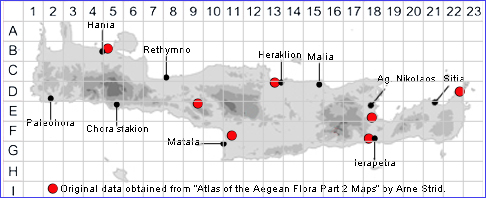
SPECIES DESCRIPTION
EUPHORBIA FALCATA subsp. FALCATA
Family and Genus:- See- EUPHORBIACEAE/Subgen. ESULA/Sect.
Common Names:- Sickle spurge
Homotypic Synonyms:- None
Meaning:- Euphorbia (L) For Euphorbus, physician to the King of Mauritania.
Falcata (L) Sickle-shaped.
General description:- Herbaceous, glabrous annual
Stems:-
1) Up to 40 cm, simple or with 2-3(-9) branches from the base, with (0-)8(-16)
axillary rays.
Leaves:-
1) 5-30 x 3-5 mm, obovate-spathulate to linear-oblong, cuneate, mucronate, entire.
2) Ray-leaves, like the cauline.
3) Raylet-leaves, up to 21 x 10 mm, asymmetrically suborbicular or elliptic-ovate,
acuminate to aristate, subentire.
Flowers:-
1) Rays, 4-5, up to 5 times dichotomous.
2) Glands, broad, with 2 horns.
Fruit:-
1) Capsule, 1·5-2 x 1-2·5 mm, shallowly sulcate, smooth.
2) Seeds, 1·2 mm, flattened-ovoid-quadrangular, pale grey or brown.
Key features:-
1) Seeds sulcate, not pitted; capsule not ridged.
2) Seeds transversely sulcate,
Habitat:- Field margins, vineyards, secondary grassland, open woodland. 0-800 m.
Distribution:- Throughout Greece, but not Peloponnisos. - Mediterranean region
and SW to C Asia. Restricted occurrence on Crete, limited to a few coastal areas.
Rare.
Flowering time:- Apr-July.
Photos by:- Steve Lenton
